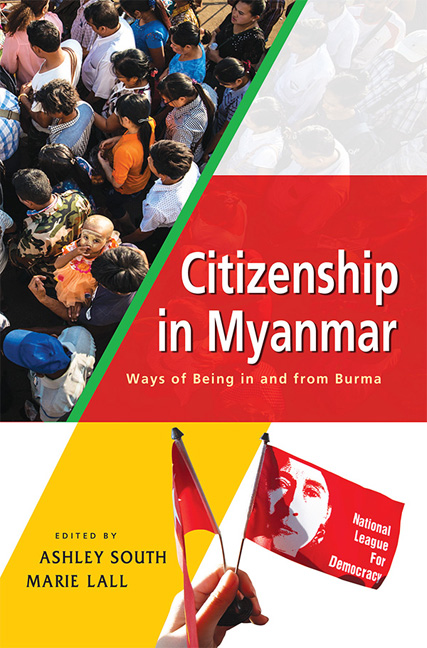Book contents
- Frontmatter
- Dedication
- Contents
- Foreword
- The Contributors
- Map of Myanmar
- Introduction
- 1 Ethnic Politics and Citizenship in History
- 2 Representation and Citizenship in the Future Integration of Ethnic Armed Actors in Myanmar/Burma
- Special Contribution: The Way Forward for Peace, Stability and Progress in Burma/Myanmar
- 3 National Political Dialogue and Practices of Citizenship in Myanmar
- 4 Citizenship and Minority Rights: The Role of “National Race Affairs” Ministers in Myanmar's 2008 Constitution
- Special Contribution: Karenni People at a Glance
- 5 Myanmar's Youth and the Question of Citizenship
- Special Contribution: I Am a Citizen of Myanmar
- 6 “The Value of Life”: Citizenship, Entitlement and Moral Legibility in Provincial Myanmar
- Special Contribution: How I Became Shan
- 7 Conflict and Mass Violence in Arakan (Rakine State): The 1942 Events and Political Identity Formation
- 8 Exploring the Issue of Citizenship in Rakhine State
- Special Contribution: Rohingya and Nationality Status in Myanmar
- 9 Myanmar's Other Muslims: The Case of the Kaman
- Special Contribution: Interview with P'doh Kweh Htoo Win
- Index
Special Contribution: I Am a Citizen of Myanmar
Published online by Cambridge University Press: 28 June 2018
- Frontmatter
- Dedication
- Contents
- Foreword
- The Contributors
- Map of Myanmar
- Introduction
- 1 Ethnic Politics and Citizenship in History
- 2 Representation and Citizenship in the Future Integration of Ethnic Armed Actors in Myanmar/Burma
- Special Contribution: The Way Forward for Peace, Stability and Progress in Burma/Myanmar
- 3 National Political Dialogue and Practices of Citizenship in Myanmar
- 4 Citizenship and Minority Rights: The Role of “National Race Affairs” Ministers in Myanmar's 2008 Constitution
- Special Contribution: Karenni People at a Glance
- 5 Myanmar's Youth and the Question of Citizenship
- Special Contribution: I Am a Citizen of Myanmar
- 6 “The Value of Life”: Citizenship, Entitlement and Moral Legibility in Provincial Myanmar
- Special Contribution: How I Became Shan
- 7 Conflict and Mass Violence in Arakan (Rakine State): The 1942 Events and Political Identity Formation
- 8 Exploring the Issue of Citizenship in Rakhine State
- Special Contribution: Rohingya and Nationality Status in Myanmar
- 9 Myanmar's Other Muslims: The Case of the Kaman
- Special Contribution: Interview with P'doh Kweh Htoo Win
- Index
Summary
In 2004, when I published my second book in the Myanmar language titled Compromising with the Burmese Generals, I quoted a paragraph from Allister Sparks’ Beyond the Miracle: Inside New South Africa:
I felt myself to be “emotionally stateless”: I could not identify with the land of my birth because it stood for things I abhorred; I felt no sense of pride when I heard my national anthem or saw my national flag.
Sparks, a South African who witnessed and wrote about the brutality of the South African apartheid regime as a journalist, was talking about his feelings regarding apartheid. This was exactly how I felt about “Burma” (which was how I named the country as an exile). Calling Myanmar “Burma” was an act of defiance for me, because I was against what “Myanmar” represented under military rule. Myanmar did not represent me; it was to be abhorred.
There were times that when I was “emotionally stateless”. I remember watching the football final between Thailand and Myanmar at the Southeast Asian Games in 1994. It was one of the few exciting games I have ever watched Myanmar play against its rival neighbour. But while my colleagues, led by Moe Thee Zun — a military regime hater himself — wildly cheered for the Myanmar team at the house we rented in Bangkok (through a Myanmar friend who was a legal resident in Thailand), I was quiet because I was not sure if I should support the Myanmar national team. The Myanmar team did very well but was unlucky in the end as a header from Thai striker Kiatisuk “Zico” Senamuang (former Thai football coach) decided the tie.
The match was the talk of the town for both Myanmar and Thais and my colleagues continued to discuss it endlessly. But I was quiet. I was not even sure if I would celebrate if the Myanmar team had won. That was my problem — I could not emotionally connect myself to the Myanmar team because I felt the team represented a regime that I was against. I thought the team itself was also corrupt with its tainted and biased selection and the national football officials bowing to the whims of the ruling generals.
- Type
- Chapter
- Information
- Citizenship in MyanmarWays of Being in and from Burma, pp. 161 - 166Publisher: ISEAS–Yusof Ishak InstitutePrint publication year: 2017



